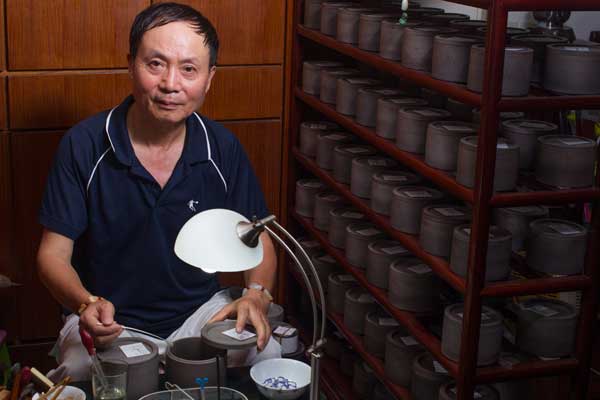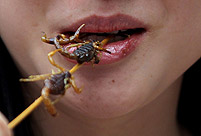 |
| Gu Haifang, who started the hobby more than 50 years ago, blames urbanization and pollution for difficulties in finding a good specimen today.[Photos by Gao Erqiang] |
Crickets are often disposed of or released into the wild after the fighting season ends in late November.
According to the Shanghai Evening Post, hundreds of thousands of crickets are sold from a single flower and bird market in Shanghai every year.
An estimated 100,000 cricket connoisseurs in the city, the largest group in the country, might spend a billion yuan a year on their hobby, buying amenities ranging from nail-size ceramic water feeders to mini bamboo buckets for taking the insects outdoors.
"It's a game every boy grows up with in Shanghai, like the Barbie dolls for girls. Rich or poor, you can always enjoy it," said He Wen, a 39-year-old Shanghai native who founded the first website in China about cricket fighting, xishuai001.com.
"You can either catch a cricket from your back yard or squander tens of thousands of yuan on a breed believed to be invincible. But they do not necessarily win," He said.
The younger generation born in the 1970s and '80s who are fond of the game are more than ready to spend, though less acquainted with the pastime than older practitioners.
He told China Daily that he spends 50,000 yuan every year on his hobby and has also invested 100,000 yuan in the website since it was founded in 2003 as "a non-profit platform for cricket lovers all over the country to share information and passion".
There are about 70,000 registered members of the website, 70 percent of them below the age of 40, according to He. They meet in person no more than twice every year, mainly to fight their coddled crickets, but online discussions such as where to catch the fieriest fighters or what kind diet is more likely to produce a winner are underway daily.
Contests of all size and level range from one-to-one street fights to official tournaments organized by government, especially after the autumn equinox, a time when crickets are believed to have stored enough energy and are strong enough to fight.
Organized by the Qibao township government, the Jiuxing Cup tournament attracted more than 100 contenders and another hundreds in the audience in September. This year's champion took home 12,000 yuan.
"Our bottom line is no gambling is involved. If there is anything we don't want to pass on from our ancestors about the game, it's the gamble part, which seriously vulgarizes the otherwise genteel game and makes it notorious," said Gu, who is one of the organizers.
Gambling on cricket fighting is illegal in China. But "black market" cricket fighting involving gambling is common, said Gu. The high stakes drive up the price of a good specimen.


 Police officer injured after gunshots outside Capitol
Police officer injured after gunshots outside Capitol 11 countries' warships arrive at Jervis Bay for security exercise
11 countries' warships arrive at Jervis Bay for security exercise Chinese tycoon aims to restore London's Crystal Palace
Chinese tycoon aims to restore London's Crystal Palace A staple of southern Chinese people
A staple of southern Chinese people Portrait of an amateur Waltz dancer
Portrait of an amateur Waltz dancer Tourists take pictures beside Qinghai Lake in Xining
Tourists take pictures beside Qinghai Lake in Xining Travel with photographer- Gansu province
Travel with photographer- Gansu province  Serena Williams stumbles through to quarterfinals
Serena Williams stumbles through to quarterfinals Thailand Mobile Expo 2013 kicks off
Thailand Mobile Expo 2013 kicks off Photo collection of Chinese Navy
Photo collection of Chinese Navy People mourn for victims of mall attack
People mourn for victims of mall attack Twins Culture Festival kicks off in Beijing
Twins Culture Festival kicks off in Beijing UNESCO world heritage site: Montale Tower
UNESCO world heritage site: Montale Tower Li Na vs Novak Djokovic in charity match before 2013 China Open
Li Na vs Novak Djokovic in charity match before 2013 China Open American batman soars through China's Jianglang Mountain
American batman soars through China's Jianglang MountainDay|Week|Month